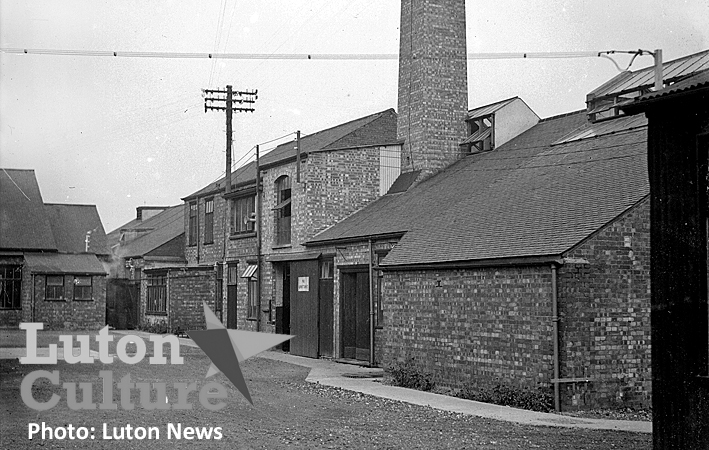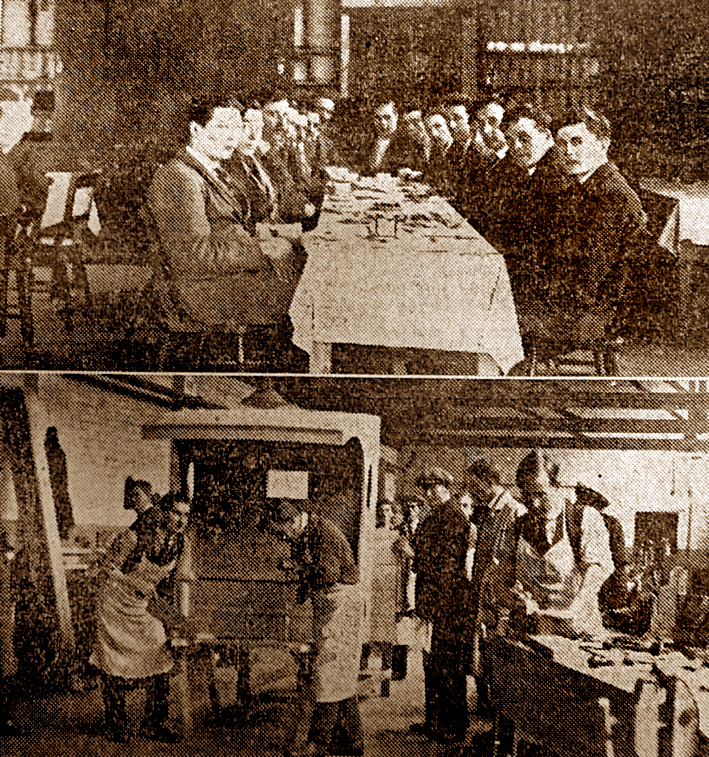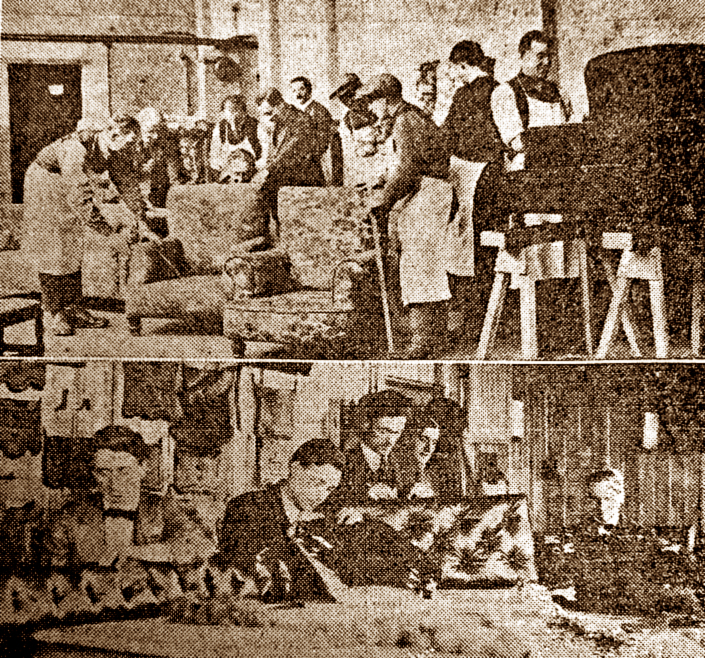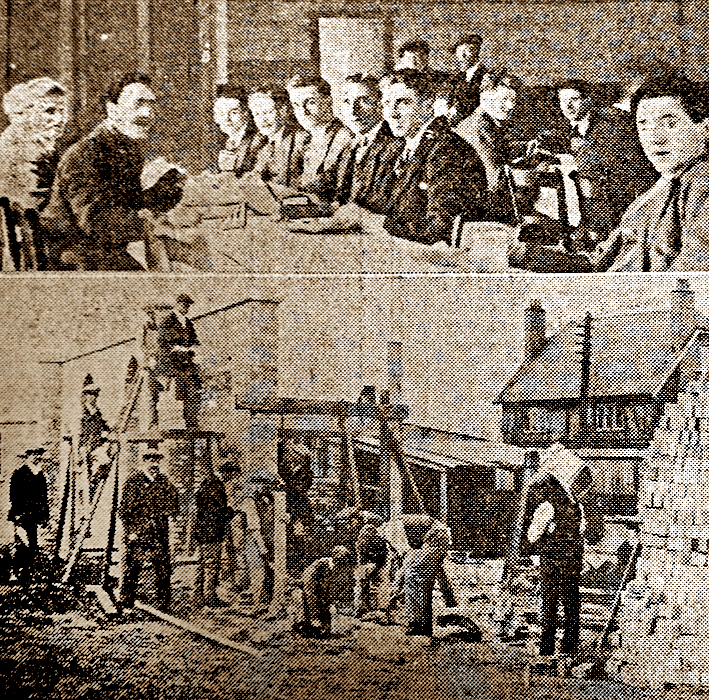
- Buildings that had been part of the Chaul End munition works, pictured in 1933.
As early as November 1919 there was speculation that the former George Kent munition works at Chaul End were to be converted into a Government Instructional Factory to retrain ex-serviceman disabled in World War One. By the following August questions were still being asked about when the facility would open, as Ministry officials had the keys to the premises.
After a warning that officialdom tended to crawl before it could run, the revamped and repaired factory opened. By March 1921, when the facility had been operating effectively for two or three months, The Luton News paid a visit and reported on the facilities available and some of the problems that had had to be overcome.
Turning swords into ploughshares is perhaps hardly an apt description of that which is happening daily at what is now the Government Instructional Factory, Luton, but which in its early days was better known as 80 Fuze Factory, Chaul End. But if the description is not wholly appropriate, the work now being carried on at the factory to a very considerable extent represents the applications of that policy.
In its busy days before November 1918 the factory was humming with work designed to assist those waging war by methods which have rendered the sword out of date. Today those people whose sole object in life at that time was to multiply the nation's resources in the way of engines of destruction have disappeared from the scene.

Their places are taken by men who, wielding various weapons of offence and defence in the service of the homeland, were broken by some action of the great war machine. Though they have been spared the greatest sacrifice, and have come back to the country which was to be made fit for heroes to live in, they have not returned as they went in the full vigour of their manhood. Some have lost a leg, others an arm; all are to some extent disabled to a degree which unfits them for earning a decent livelihood for themselves, and very often families, at what hitherto was their ordinary occupation.
A blacksmith does not improve his prospect at his trade by becoming minus a right arm. Nor is a farm labourer rendered the fitter for his job by losing a leg. These are merely examples, but they serve to indicated the lasting disadvantage at which some of these men would be placed were they just turned out into the world to shift for themselves as best they could. Even so, some would triumph over their handicaps, but the general run of these men would suffer.
True, they have disablement pensions and allowances, but not many fortunes can be made out of these. The people who fix that intangible thing called the cost of living see to that. But it is possible for a man who by reason of his disability cannot follow one trade to be put in the way of learning another where his physical incapacity will not hamper him so much, and it is to help some of these men turn their hands to a new task that this Instructional Factory is now in operation.
Admirable as this scheme is, the powers that be could not, or would not, move hurriedly in the matter. Much water flowed under the bridges while it seemed that nothing was being done but talk – and Armistice Day was more than two years old before the factory opened its doors to receive under its roof the first of the men sent there for training.
For none of this dilatoriness can the blame be laid on the shoulders of local people whose sympathies lead them to take a share in ameliorative work among those who have to scrape along as best they can on their pensions. They fully realised the need and some of them, in connection with the staple trade, established a training factory which the authorities gave a mild blessing but did little to assist. So they dipped into their own pockets for the wherewithal to set the factory going, did the pioneer work very successfully, and proved the wisdom and soundness of their scheme. Then, and then only, did the Ministry of Labour step in and relieve them of the work.
The scheme was initiated by businessmen, which may account for the manner in which they got to business without much waste of time. Also, they were training men for a trade of which they knew the ropes. It may not have been so easy to settle questions affecting the trades into the mysteries of which it was proposed to initiate the men sent to the Government Instructional Factory.
Some of them – perhaps all of them – are trades in which trades unionism is very strong, and to make it possible for men to enter those trades after undergoing an intensive training at this and similar institutions may have required much delicate negotiation.
Whatever the cause for the delay, there was so much delay that those whose earnest desire it was to see something of this sort accomplished were being compelled to realise the truth of the old proverb about 'hope deferred' for it seemed almost as though nothing would ever be done except on that 'tomorrow' which never becomes today.
Then, without fanfare of trumpets or other display, the work began. True, some of the men to be trained arrived before the factory was ready for them, but their previous Army experience probably inured them to that sort of thing, for personal inconvenience to rank and file was not always a matter for much consideration in those days.
Adaptable as 80 Fuze Factory was for an institution of this character, the work of adaptation still had to be done. A factory, and especially one hurriedly built to meet a war need, does not improve its weather resisting qualities by being left unused for months. Before it was fit for its new purpose, therefore, a considerable amount of work had to be done.
Some buildings were not conveniently arranged for the use to which they were to be put. Some roofs let in more light and water than was altogether comfortable for winter tenants, and meanwhile trainees were arriving. Somehow, first essentials were attended to hurriedly, and the difficulties of the moment were got over by the best means that could be devised by those in charge of the work, in order to carry on until the general contract for alterations and repairs could be completed.
The period of delay and disappointment can now be said to have passed. In this, as in other matters, there is little use in crying over spilt milk, and the more useful policy is to make the best use of the present rather than mourn over the wasted time of the past. The essential fact today, and one which is not known as widely as it should be is that the Instructional Factory is now in operation.

Its activities have not yet reached their fullest extent, but 13 trades associated with three main branches of industry are already being taught, and some 200 disabled men are receiving instruction. Further classes will, it is hoped, be added soon. The sections at present in operation are:
Furniture – This includes cabinet work, upholstering, wood machining and French polishing.
Vehicle building – In this section men are being taught coach smithing, coach trimming, body making, coach painting and metal panel beating.
Building – Carpentry and joinery, plumbing, bricklaying, and painting and decorating are at present being taught.
Every one of the 200 men is a disabled ex-serviceman. Some, although not all, of heir instructors are also ex-servicemen, and the administrative and maintenance staff is composed wholly of disabled men from the Services. The area from which the trainees – that is the description which some official mind invented for them – are drawn is known as the South Midlands District, and includes the counties of Beds, Bucks and Herts.
Probably some 50 of the men are Luton men, the others come from various places in the area mentioned. They cannot all make the journey from their home daily. Those who can do so conveniently live at home, but they must arrive at the factory at 8am, as in an intensive course such as this no time must be wasted.
About 100, however, live on the premises and sleep in big dormitories. Naturally they have to be subjected to a certain amount of discipline, even in leisure hours, but this is probably the less irksome when compared with the conditions under which many of them had to live in the war period, and very earnest efforts are directed towards making their stay at the factory as happy and profitable as possible.
Through the courtesy of Captain Heath Walker, who is in charge, we had an opportunity of going through the factory in working hours a few days ago, and of inspecting the work in progress in all the departments. And, but for the fact that the courses are so limited in duration and the dislocation of work which must result, we should seriously urge that from time to time there should be an open day, so that people in the town might see what we are able to see and gather first-hand impressions of the very excellent work which is being accomplished.
Some of the courses are limited to a period of six months, but the majority last for nine months. When one remembers the years covered by apprenticeships in the majority of skilled trades, these periods seem all too short, but when one sees the work being done by men who have at the outset been at the outset, one begins to probe for the secret of this progress. Apparently it is to be found in the fact that the prime business of the day is to teach, and not merely to get work done as an ordinary commercial transaction.
Each of the three main sections is in charge of a chief instructor who is a master of his craft, and for each branch of that section there is an assistant instructor who not only knows how to do things but also how to put others in the way of doing them.
The human material on which they have to work is not always the most adaptable. Some of the men are being taught work far removed from anything which was their lot in more peaceful days, and as men grow older they do not so readily adapt themselves to new things and new ways. But the classes are small enough for the instructor to be able to take a direct personal interest in the work of each man, and a careful system of records makes in practicable for the progress of each man in his particular occupation to be traced week by week and month by month. Where one appears not to have maintained his rate of progress he is immediately the subject of special attention and encouragement, and in many cases this works wonders.
Another very important factor is the keenness of the men themselves. They go home at the weekend, and their families want to hear of their progress. It is known that there are cases where men have been absolutely distressed because they could not honestly tell the people at home that they were getting along as well as they would like to. The instructors seem to have a way of finding these people and smoothing their path for them.
Very full recognition, too, is given to the fact that if the work which men are doing interests them, half the battle is won. Where they have to do the same thing day after day, and complete a job only to take it to pieces and do it again, it is difficult to maintain interest and enthusiasm at a high pitch.
Unfortunately there are one or two sections where at the moment this monotony seems almost unavoidable, but on the whole the men are relieved of this, and some of them are now doing work which in the old days many men never had a chance of touching until long after they were out of a lengthy apprenticeship.
Take the furniture section, for example. For armchairs, Chesterfields etc, the making of frames is a specialised branch of the trade, and those used in this section are made in another factory by other disabled men. Here they are upholstered, and some of the finished goods would not disgrace the showrooms of a West End establishment.
Other articles of furniture, however, are begun right at the beginning. Even the very primary handling of tools has to be learned in some cases, and the surprising thing is that in a short space of time the men have advanced from that to the completion of some furniture that would satisfy the most exacting purchaser.
Bookcases, bureaux, a dressing table, plant stands – these are some of the things we saw completed, to say nothing of a good store of kitchen tables. Other kinds of furniture will follow, and even inlaying and veneering is in prospect. There must be some art even in French polishing, but it seemed fairly simple to these men – even to some blessed now with one arm.
Steps are being taken to market the furniture, and we believe some members of the Pensions Committee who have visited the factory have ordered some things. The general policy to be adopted, however, is to get a Trade Advisory Committee to assess the selling value, it being intended not to undercut ordinary traders.
One thing can be confidently stated. Housewives who do become possessed of any of any of the work done in this factory may be assured that the furniture is soundly made. There is no scamped work in it, not is fine polish but a cloak to hide other shortcomings.
The development of a market for the furniture is desirable, as only in this way can a constant variety of work be provided, while to the men responsible there is no little satisfaction and encouragement in knowing that they are actually producing the real thing.
In the vehicle building section much useful work has already been done. Here the men had to begin by making their own benches. Much of their early work, of course, had little value apart from the instructional, but they quickly passed from that stage. Some of the men have taken to smithing as though born to run a forge.
The coach painters found a useful outlet in their early efforts in preparing all the directional signboards which are now dotted about the factory. Some of the men have since done some elaborate ornamentation over the stage in the recreation room, and when we were there others were busy painting and lining panels with an aptitude which was very encouraging.
In the body shop there was something which looked as though it might once have been a chassis. Probably it will never run under its own power again, although it might, as appearances are always deceptive. But before long it will certainly emerge in all the glory of a new body. The men are being shown the way to do it, and are determined to do it. In another part of the same shop others were busy on a body for a Ford ton chassis. This body was well on the way, and perhaps later a purchaser will be forthcoming.
Some of the panel beaters were doing work which the writer would not like to attempt after only a month or so's instruction, and doing it well. And in this department there was even some acetylene welding in progress.
It was with the men who were doing the leather work for cars etc that the principal difficulty seemed to be found in keeping up the interest. There is not an unlimited supply of material available, and when cushions have been made and unmade several times continual repetition of the same job is apt to become rather wearisome, but perhaps even here a way to alter this may be found.
The men in the building section were as busy as the rest. They are not just laying straight rows of bricks, although, of course, this had to be done. The bricklayers have built, among other work, a substantial wall with windows arched in three different ways. They have done another tricky job under the supervision and with the help of the instructor, and when our visit was paid they were busy trying to repeat this job without the help or guidance of the instructor. We hope they succeeded, as it appeared they would, for their self-confidence will not suffer thereby.
The carpenters and joiners were progressing just as much as the bricklayers. Doors have been made and found their way to a painters' shop. Something has been learned of how the timbers of a roof should go together. Some very awkward gabling has been leaded, and the plumbers have been busy installing cisterns, fitting gas and water supply etc.
These do not cover all the activities which are in progress, any more than do the things which have been referred to in connection with the other sections. They are merely quoted to illustrate the very practical direction which the instruction takes.
In fact, but for the difficulty presented by the absence of sewers at this extreme point of the borough, Captain Walker told us that the erection of some houses on the Dunstable Road frontage of the factory site would be seriously contemplated as an effective way of providing still more practical instruction, while at the same time helping to fill a very great need.

However, it is not all work and no play at the factory. Working hours are from 8 to 12.30, and from 1.30 to 5. Pensions and allowances are consolidated in the special allowance paid to men undergoing training in this way. Under this special scale of allowances a single man gets 40 shillings a week. Married men who are ex-privates get additional allowances in respect of wives and children, the basis being wife, 10s; first child under 16, 7s 6d; each additional child under 16, 6s. Disabled ex-NCOs and warrant officers receive certain additional payments, and there is an efficiency bonus paid under certain conditions, and a provision for travelling expenses.
For those living in a caterer provides meals for 21s a week (rebate allowed when men are on weekend pass), and 5s per week has to be paid for sleeping quarters. Men who come daily can also get meals, or can bring their food and have it heated.
The welfare side is the subject of considerable attention. There is a football pitch within the factory grounds. A fine recreation room has also been provided, and this has some useful equipment in the way of a piano, provision for billiards etc. The stock of other indoor games is not too large, and kind-hearted people who care to make gifts will not find their interest unappreciated.
Concerts, whist drives etc are arranged occasionally, and all these things help to make the lot of the men considerably more tolerable than they probably thought would be the case when they first found themselves placed on the disabled list.
We must not omit mention of the little hospital, with a trained nurse in charge. Some men, unfortunately, still suffer periodically from the effects of their wounds, and in these cases when men are out of sorts and work is not practicable, there is a quiet little ward where they can go to get the help which is necessary to ease their pain and put them on the road to getting fit again. Some of the doctors in the town have also interested themselves in the institution in first aid etc.
It is hoped that later the operations of the factory will be extended to include copper smithing, pattern making plastering, brass founding, and fitting and turning.
[The Luton News: Thursday, March 31, 1921]

